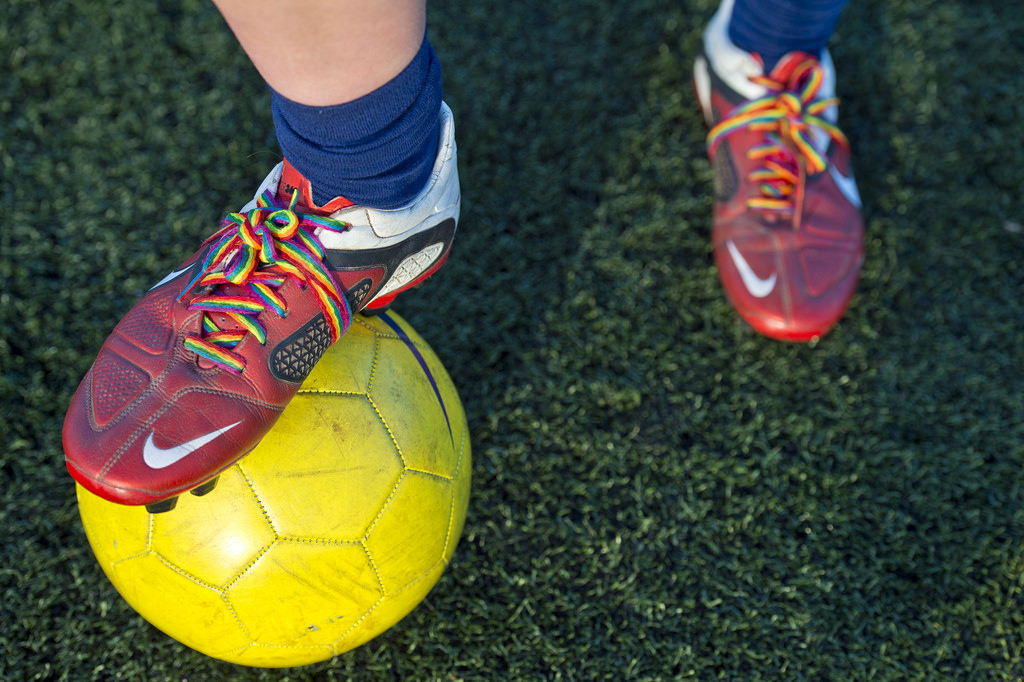
I want to make something perfectly clear before we proceed any further. I am not disregarding the work that charities like Stonewall (who orchestrate the rainbow laces campaign) and Kick It Out do to tackle the issues of racism and homophobia in the game. These organisations are admirable in their aims, and should be applauded for trying to bring about a tide shift in football. What I am arguing is that this shouldn’t be a war they have to wage alone – they should be receiving backing from international bodies on a level that goes beyond obvious and fleeting visibility. Sadly, they are not – indeed, the actions of FIFA et al go far beyond simple indifference; instead, it seems at times that football’s world governing body is acting in direct opposition to the aims of those trying to strip the game of prejudice.
The best – and seemingly most obvious – example of this is the awarding of the two most imminent world cup tournaments. In 2010, surrounded by much controversy, Sepp Blatter (then President of FIFA) announced that the 2018 and 2022 world cup finals would be hosted by Russia and Qatar respectively, under the guise of growing the global game by taking it to countries that had never hosted international tournaments before. However, this bare-faced lie has been seen for what it is in subsequent years: a cash-grab by an organisation with little-to-no respect for those marginalised within the footballing community. Russian football is regularly plagued by horrific incidents of racism – indeed, in 2014, Christopher Samba asked his manager at Russian side Dynamo Moscow to substitute him at half-time, as he felt he could not continue to play whilst being subjected to such vitriolic racial abuse. However, far from this incident being limited to a handful of narrow-minded supporters, when it emerged that Samba had retaliated against his aggressors with a lewd gesture, the Russian FA saw it fit to ban him for two matches.
This is to say nothing of the plight of LGBTQ fans (and players, closeted as they may be) at the next two major global competitions. Queer fans will have to contend with travelling to two countries with active laws against homosexuality – and what was FIFA’s response? Was it to throw their considerable weight behind the LGBTQ community and pressure Russia and Qatar into changing their laws, in order to hold such a prestigious event? No. It was to warn Gay fans to ‘not hold hands’ at next year’s tournament for fear of retribution. The fact that the decision over host countries was made eight long years ago should not count in favour of FIFA’s inaction – these decisions are never set in stone, and are liable to change. The 1986 World Cup was initially to be hosted by Colombia until, in 1982, under a cloud of financial difficulty, the country relinquished hosting duties to Mexico. It’s not exactly as though FIFA had no opportunity to review their decision process for 2018 and 2022 either – after the scandal that saw Gianni Infantino replace Blatter as president last year, the governing body would have been well within its rights to cast another glance over the bidding process from 2010. However, self-regulation doesn’t seem to be high up on the organisation’s agenda.
This is not, however, simply an issue that the domestic football fan can pass over by claiming that FIFA has always been a corrupt organisation, and that football operates differently at an intra-national level. In fact, if we take the example of English domestic football, the problem seems to be more pronounced. Both the Chairman and the CEO of the FA (Greg Clarke and Martin Glenn respectively) have come under such intense scrutiny over the issues of racism and homophobia recently that both can be said to be clinging to their jobs by the thread of a Football Association tie. Both were criticised heavily by a parliamentary committee for their handling of the Eniola Aluko fiasco (Aluko accused the women’s team manager, Mark Sampson, of racist comments and the FA failed to sack him with anything like the appropriate gusto), with Clarke also criticised this year for saying that he was reluctant to push through diversity reforms as he felt he would get ‘F****ing fired’ as Chairman of the FA. Which is all to say nothing of the fact that Clarke – the gift that keeps on giving, like herpes – said recently that he would discourage gay footballers from coming out of the closet. And all of this is a summary merely of the scandals that have beset the FA since March 2017.
I am worried that this piece is starting to approach something of a rant, so let me pull back and attempt to be circumspect for a moment. There is no doubt that the charities Kick It Out and Stonewall do excellent work within the footballing community. There is also no doubt that football, certainly in Western Europe, is a more tolerant game than it was in decades past – we have come a long way from the bullying culture that saw Justin Fashanu tragically take his own life fewer than 20 years ago. True as that may be, however, this is not the time to rest on laurels. Progress is always welcome, and there is far more progress to be made, but this progress cannot and will not happen unless national and international governing bodies take decisive action against institutional racism and homophobia – such as taking away international tournaments from countries with appalling civil and human rights records. So, pleased as I was – and always am – to see the Rainbow Laces campaign being supported far and wide across the international sporting community this past weekend, it is time for the tokenism to end and for the real action to begin.






